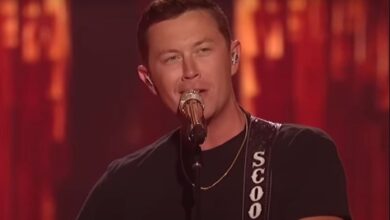Pain heard in his voice; he passed two months later, roaring like an old lion
Johnny Cash’s final live performance, held at the Carter Family Fold in Hiltons, Virginia on July 5, 2003, stands as a poignant testament to his enduring legacy and indomitable spirit. Just two months shy of his passing and in the wake of his beloved wife June Carter Cash’s recent death, Cash demonstrated remarkable resilience and dedication to his craft. Despite his frail health, which included significant vision loss and physical weakness, Cash’s presence on stage was as commanding as ever.
Opening the concert with his iconic greeting, “Hello, I’m Johnny Cash,” Cash immediately connected with the audience in a way that only a seasoned performer of his caliber could. Supported by a small band that included his son John Carter Cash on vocals, Jerry Hensley on guitar, and Bobby Starnes on bass, Cash delved into a set list that spanned the breadth of his storied career. From the electrifying energy of “Folsom Prison Blues” to the heartfelt balladry of “I Walk the Line,” each song resonated with the audience, carrying with it the weight of Cash’s unparalleled life experiences.
One of the most emotionally charged moments of the evening came during Cash’s rendition of “Angel Band,” a song that had been sung by Emmylou Harris at June Carter Cash’s funeral. As he sang, Cash’s voice, though weathered by time, conveyed a deep sense of loss and love for his late wife. Another poignant highlight was “Understand Your Man,” a song he hadn’t performed in over two decades, imbued with a sense of nostalgia and reflection on his long and storied career.
Throughout the performance, Cash’s voice, though frail, carried a profound emotional weight. Between songs, he spoke candidly to the audience, reflecting on the enduring presence of his wife’s spirit and the inspiration she continued to provide him. This intimate connection between the personal and the performative underscored Cash’s ability to intertwine his life experiences with his music, creating a deeply moving experience for all in attendance.
Johnny Cash was more than just a musician; he was a cultural icon whose influence extended far beyond the realm of music. Known for his distinctive voice and rebellious spirit, Cash traversed multiple genres including country, rock, and folk, attracting a diverse and dedicated following. His music not only captured the struggles and triumphs of everyday life but also delved into deeper social issues, reflecting his own convictions and experiences.
Beyond his musical prowess, Cash was revered for his humanitarian efforts and advocacy, particularly for prisoners and marginalized communities. His songs often served as vehicles for social commentary, resonating with audiences worldwide. Throughout his career, Cash remained unapologetically true to himself, never shying away from controversial topics or difficult conversations.
Johnny Cash’s final performance at the Carter Family Fold stands as a poignant closure to a legendary career that spanned decades. It encapsulated his unwavering commitment to his art and his ability to connect with audiences on a deeply emotional level, even in his final days. Despite the physical challenges and profound personal grief he faced, Cash’s performance was a testament to his enduring legacy as a musician and a person who lived his life with authenticity and integrity.
In the annals of American music history, Johnny Cash remains a towering figure, celebrated for his contributions to the art form and remembered for his profound impact on generations of listeners. His final concert serves as a fitting tribute to a man whose life and music continue to resonate with people around the world, reinforcing his status as a true icon of the 20th century.





